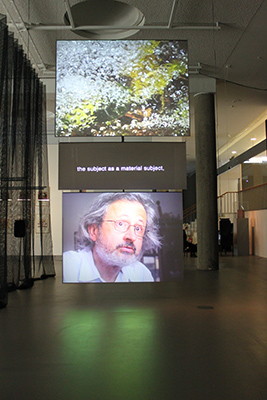The starting point of the two-part visual research projects Assemblages and Life of Particles is an interview conducted with the French psychotherapist, political activist, and philosopher Felix Guattari in 1992. Guattari was a major influence on the New Left after 1968, and he is also known for his collaborative work with philosopher Gilles Deleuze. His work was directed against the modern Western concept of a patriarchal and colonialist subjectivity. In his La Borde clinic in France, Guattari and colleagues helped advance a worldwide movement against dominant psychiatry, which they regarded as an oppressive institution that violently enforced such normative and alienated forms of subjectivity. Working with patients, artists, theorists, and scientists, they implemented a radical “politics of experimentation” at La Borde.
With archival material and additional interviews by Guattari’s colleagues and friends, Assemblages follows Guattari from La Borde to Brazil and Japan, two countries where he travelled extensively in his quest for alternatives to a Western ontology that separated nature from culture, signs from things, and the individual from the collective—separations Guattari saw as being at the root of contemporary crises. It was on these journeys that Guattari began to develop an interest in animism and studied so-called animist cultures and practices, in which subjectivity is not located in the human alone, but distributed in polyphonic forms throughout an environment. He called these forms “assemblages.”
The second part of this project, Life Of Particles, is a journey that begins with Guattari’s experience in Okinawa, diving into the imperial history of the region as experienced on an everyday basis, not least through the massive presence of the US military since WWII. Life Of Particles also enters into a dialogue with the contemporary situation of Japan and the relation between subjectivity, animist spirituality, and modern technology in the aftermath of the 2011 earthquake and nuclear disaster. In the separate installation Two Maps, photographer and anthropologist Chihiro Minato discusses both the changes of landscape and the landscape of media in the aftermath of Fukushima.
Angela Melitopoulos, born 1961 in Germany, lives and works in Berlin
Maurizio Lazzarato, born 1955 in Italy, lives and works in Paris

